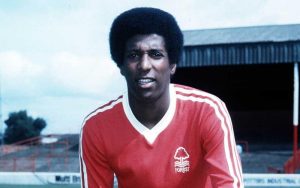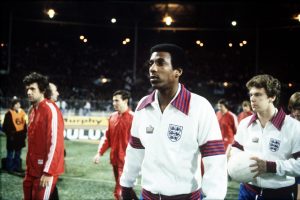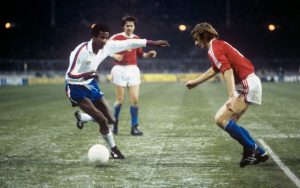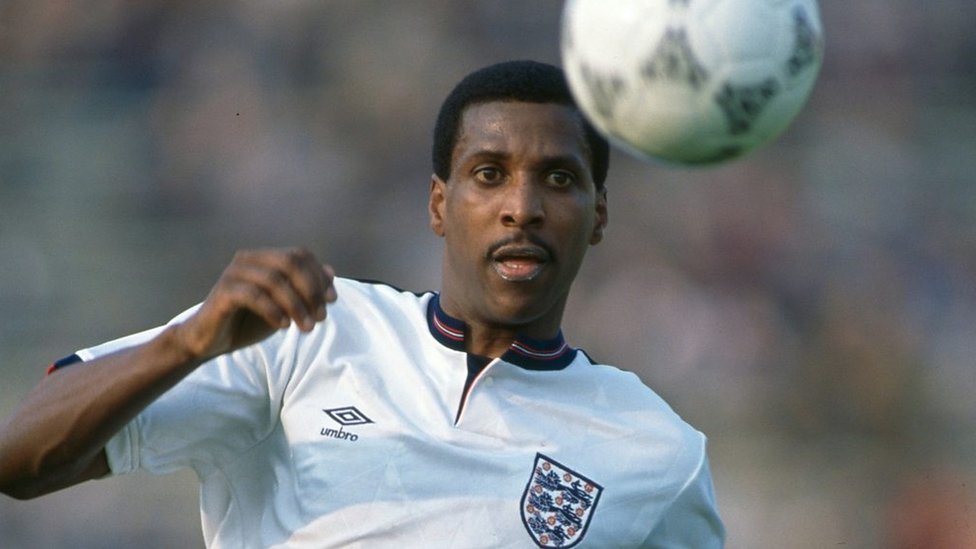The England national team in the 21st century is a vision of multiculturalism filled with stalwarts such as Raheem Sterling, Kyle Walker, Marcus Rashford and Dele Alli who have all become mainstays in Gareth Southgate’s Three Lions’ squad.
It is hard to imagine a team without the stars, especially after many of them immortalised themselves in the hearts and minds of the English fans during the 2018 World Cup, where they reached the Semi-Final for the first time in 28 years.
However, there was a time when few black players were given the opportunity to ply their trade in English football at all, let alone play for the national team.
It wasn’t until 1978, after 106 years of International football in the country, that Viv Anderson changed the face of the English game for good.
Born in Nottingham to Jamaican parents, Anderson started his schoolboy footballing career at Manchester United. However, after spending a year at the red devils before being released, it was at Nottingham Forest where he made his name.

He went on to make over 300 appearances for the club and formed a part of the famous squad who, against all odds, won back-to-back European cups, before moving to Arsenal in 1984.
Ugly Game
Racism was rampant in European football in the 70s and 80s and England was no different. The infamous image of Jamaican-born former Liverpool winger John Barnes backheeling a banana on the sideline that was thrown at him during the Merseyside derby has become the unnofficial poster for both the ugliness of ‘the beautiful game’ during one of its darkest periods, and the strength and heroism of players like Barnes and Anderson to not just play through the horrific abuse but to prosper in it.

Speaking to former Arsenal and England striker Ian Wright, Anderson recalled the time Clough encouraged him to stand up to the shamefully prevalent rhetoric.
“I remember going to Carlisle, something happened and I’m sat down within five minutes. And he said, ‘I thought I told you to warm up.’ I said, ‘Well they’re throwing apples and pears and bananas at me.’ He said, ‘Go back out there and get me two pears and a banana.’” Anderson said.
“And then in the dressing room he pulls me aside and says, ‘I did that for a reason, you know – because if you let them dictate to you, you aren’t going to make a good career and I think you can play. Don’t let them influence you in any way.’”
Call Up
After just two full seasons in professional football, Anderson earnt his first international call up from then-England coach Ron Greenwood and on November 29th 1978 cemented himself in history as the first black player to ever play for England.

However, Anderson is modest when speaking of the landmark moment, often choosing to laud those who came up with him and admitting that when he first pulled on the Three Lions’ strip it was business as usual to him.
“At the time, I wasn’t really aware of the significance of being the first black England international. We were all young footballers trying to get on and make a living.” Said Anderson in an FA retrospective on his career.
“What I would like to say though is that the likes of Cyrille Regis and Laurie Cunningham, who are sadly no longer with us, should really be mentioned at this stage.”
Pride
But the former Forest favourite allows himself a small semblance of self-pride and congratulations when recalling a conversation he had with Norman Whiteside whose appearance for Northern Ireland at the 1982 World Cup set the record for the youngest player to play in the tournaments finals.

“I remember my former Manchester United team-mate Norman Whiteside, who is still the youngest player to have played in the World Cup Finals, telling me that one day his record will be beaten but mine will never be beaten. It’s an analogy I still tell people today, so I’m proud and privileged to have been the first black England international.”
Kinder Game
Anderson’s rise through the ranks at Nottingham Forest and eventual national team call up was a sign of hope during a time where the signs were far and few between for black players. His dedication to prospering in the most hostile of environments helped him achieve all that he deserved and made an undeniable change to the politics of football.
Forty years later, English football is a kinder place than it was in Anderson’s day and whilst still far from perfect, his impact on the game has no doubt made the goals and aspirations of black English footballers more achievable than he could have ever imagined.
(Image:Getty)




